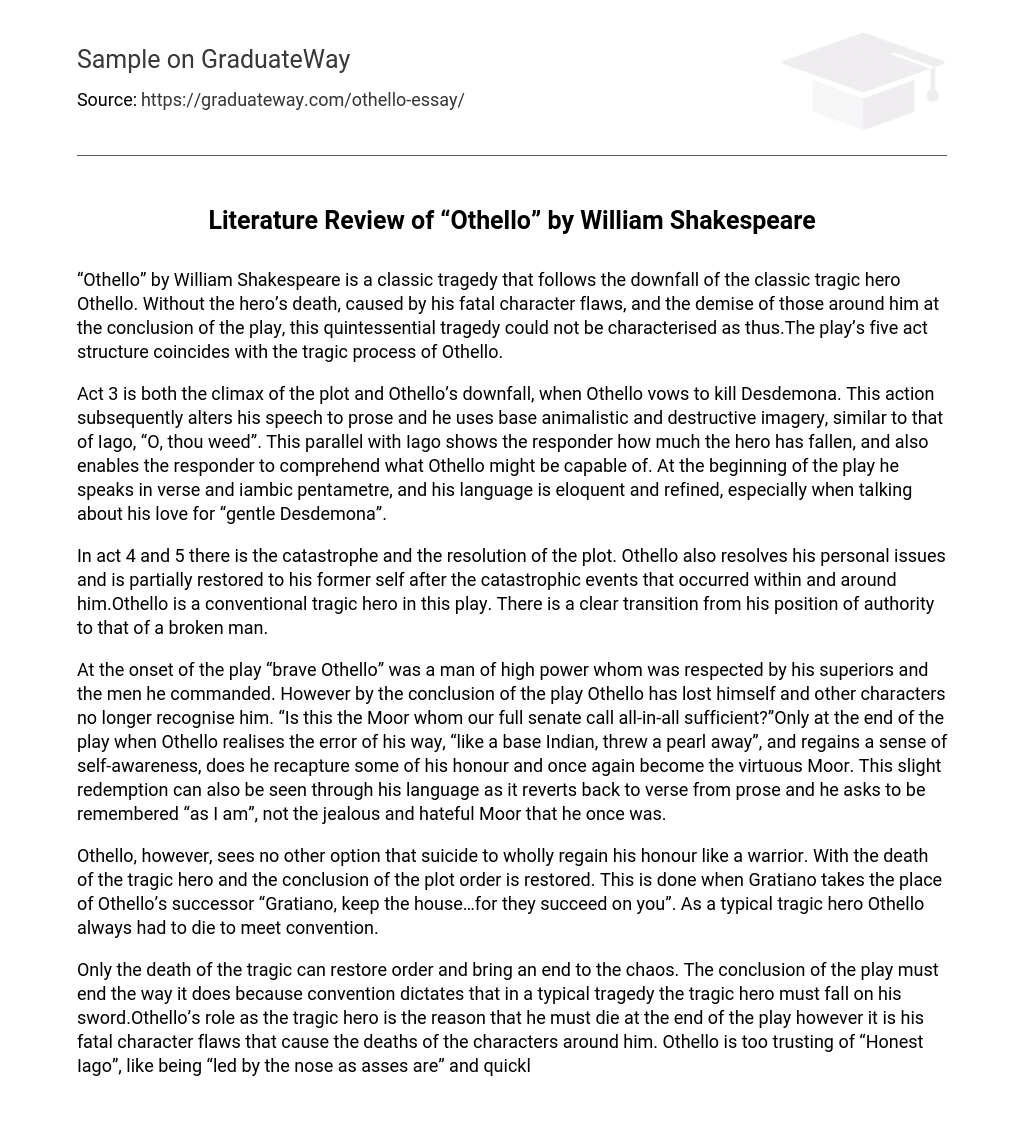“Othello” by William Shakespeare is a classic tragedy that follows the downfall of the classic tragic hero Othello. Without the hero’s death, caused by his fatal character flaws, and the demise of those around him at the conclusion of the play, this quintessential tragedy could not be characterised as thus.The play’s five act structure coincides with the tragic process of Othello.
Act 3 is both the climax of the plot and Othello’s downfall, when Othello vows to kill Desdemona. This action subsequently alters his speech to prose and he uses base animalistic and destructive imagery, similar to that of Iago, “O, thou weed”. This parallel with Iago shows the responder how much the hero has fallen, and also enables the responder to comprehend what Othello might be capable of. At the beginning of the play he speaks in verse and iambic pentametre, and his language is eloquent and refined, especially when talking about his love for “gentle Desdemona”.
In act 4 and 5 there is the catastrophe and the resolution of the plot. Othello also resolves his personal issues and is partially restored to his former self after the catastrophic events that occurred within and around him.Othello is a conventional tragic hero in this play. There is a clear transition from his position of authority to that of a broken man.
At the onset of the play “brave Othello” was a man of high power whom was respected by his superiors and the men he commanded. However by the conclusion of the play Othello has lost himself and other characters no longer recognise him. “Is this the Moor whom our full senate call all-in-all sufficient?”Only at the end of the play when Othello realises the error of his way, “like a base Indian, threw a pearl away”, and regains a sense of self-awareness, does he recapture some of his honour and once again become the virtuous Moor. This slight redemption can also be seen through his language as it reverts back to verse from prose and he asks to be remembered “as I am”, not the jealous and hateful Moor that he once was.
Othello, however, sees no other option that suicide to wholly regain his honour like a warrior. With the death of the tragic hero and the conclusion of the plot order is restored. This is done when Gratiano takes the place of Othello’s successor “Gratiano, keep the house…for they succeed on you”. As a typical tragic hero Othello always had to die to meet convention.
Only the death of the tragic can restore order and bring an end to the chaos. The conclusion of the play must end the way it does because convention dictates that in a typical tragedy the tragic hero must fall on his sword.Othello’s role as the tragic hero is the reason that he must die at the end of the play however it is his fatal character flaws that cause the deaths of the characters around him. Othello is too trusting of “Honest Iago”, like being “led by the nose as asses are” and quickly believes his web of lies.
Although Iago’s duplicity is obvious to the audience through his soliloquies and asides, “I hate the Moor” Othello’s trusting nature blinds him to this. The substance of the plot is based on unfounded information and half-truths, and without this flaw Othello may have been able to recognise this and also recognise Iago’s deceit. Othello’s trusting nature can also be seen in Act 1 when he uses proleptic irony “my life on her faith” when first questioned about Desdemona’s possible deception.Othello’s other major character flaw is his jealousy.
The “green-eyed monster” forces Othello to act rashly before he can prove Iago’s story of Desdemona’s betrayal. After Iago abuses Othello’s trustworthy nature he sends him into a “jealousy so strong that judgement cannot cure” and Othello vows not only to kill Desdemona but Cassio as well.Othello’s character flaws lead him to make rash decisions and cloud his judgement causing a domino effect that ended in the death of Desdemona and other characters. If Othello did not have these flaws in his character then the ply would have concluded in a very different manner.
Othello’s jealousy driven actions would have been replaced with logical and collected thinking, saving the lives of not only Desdemona and Emilia but himself as well. However convention dictates that the tragic hero must have tragic flaws that lead to his downfall as well as those around him, so the other characters, especially Desdemona had to die because Othello’s fatal flaws could not allow otherwise.As a definitive tragedy, “Othello” must follow the tragic hero’s fall from grace, caused by his fatal character flaws. The actions that he takes because of these flaws not only lead to his destruction but also the deaths of the characters around him.
Iago’s lust for revenge may be the catalyst for the disastrous events, however only Othello’s flaws and subsequent actions can account for the simply tragic end of this play.





